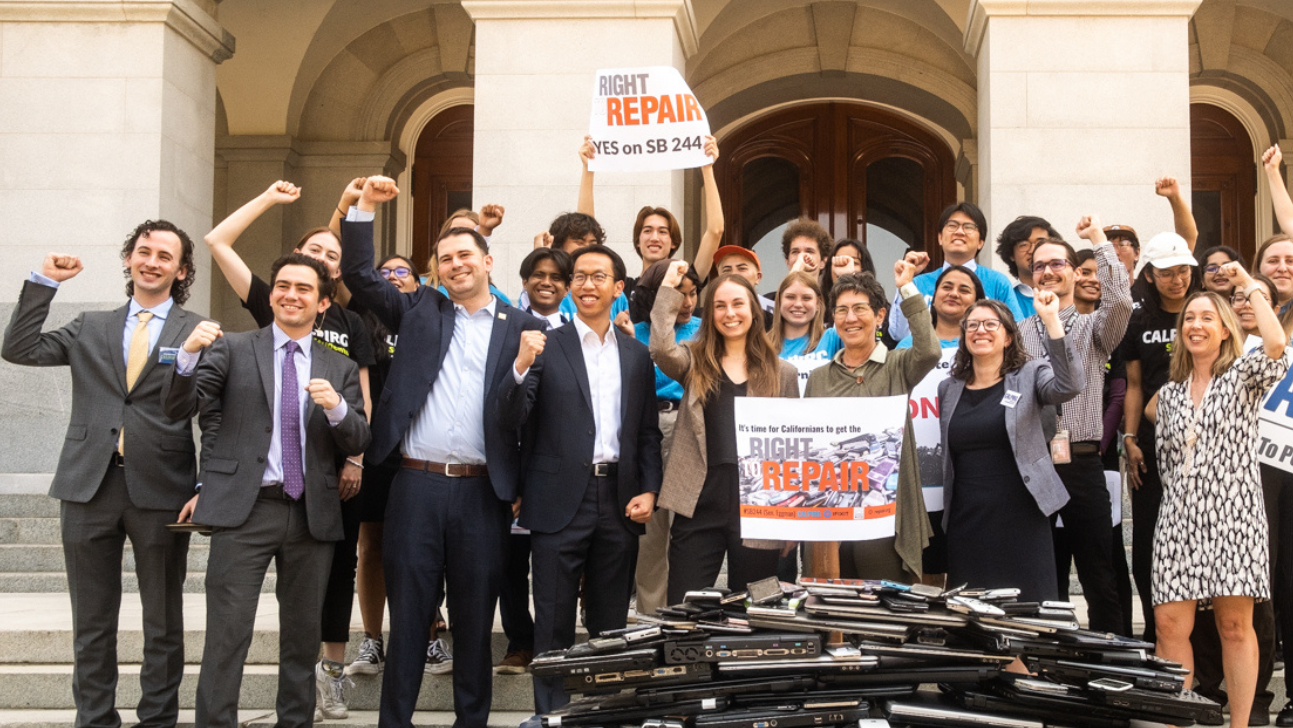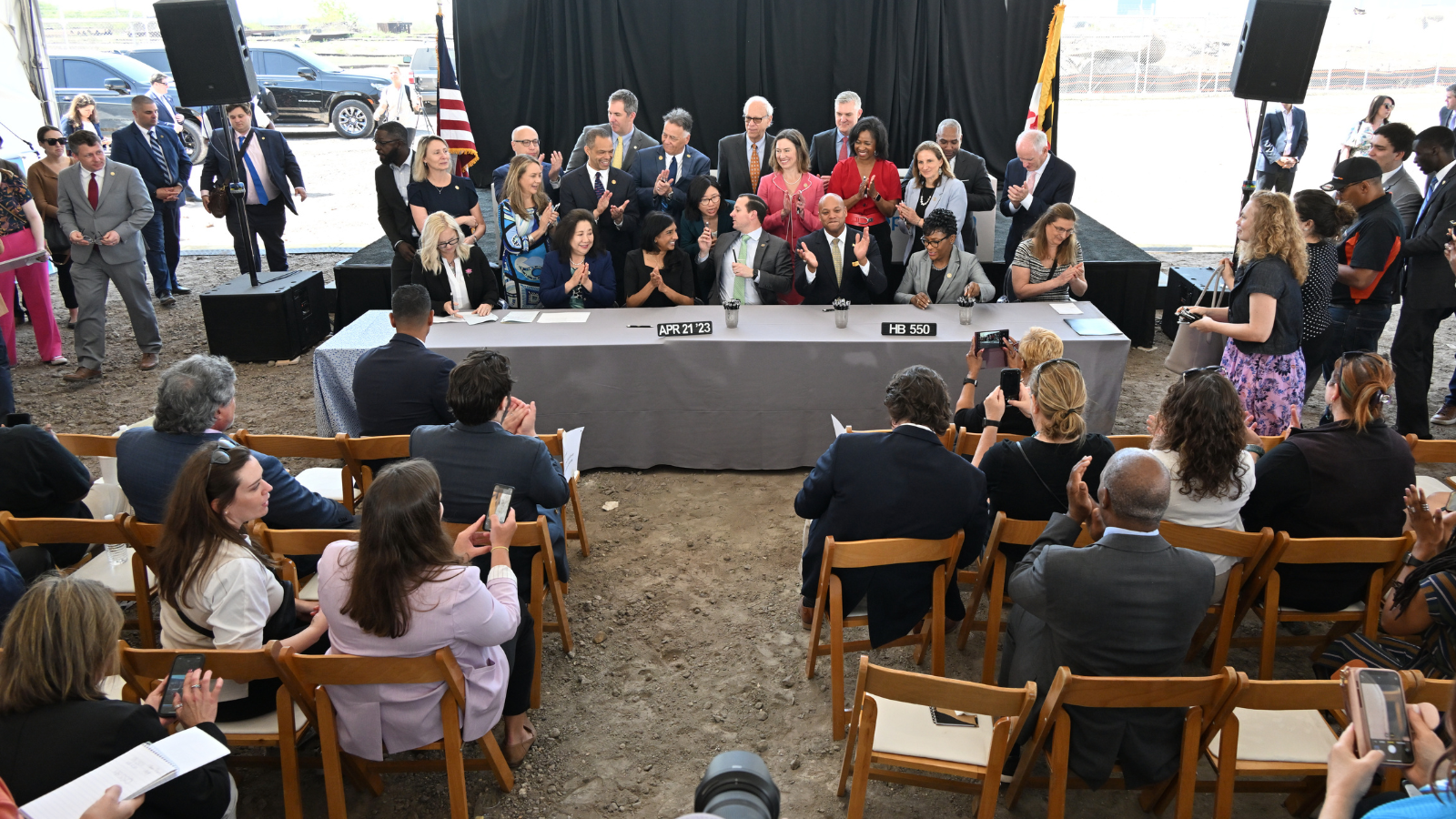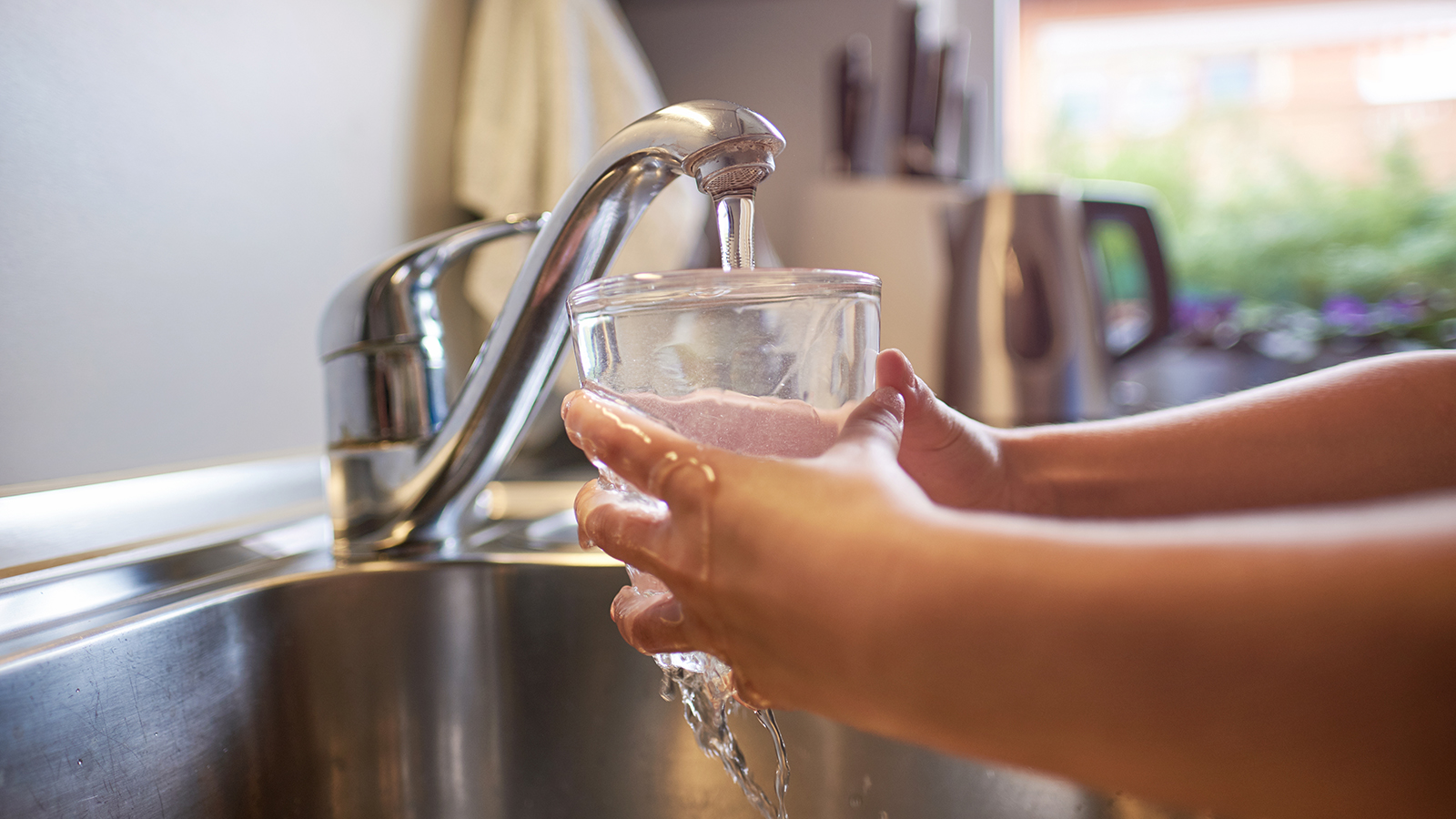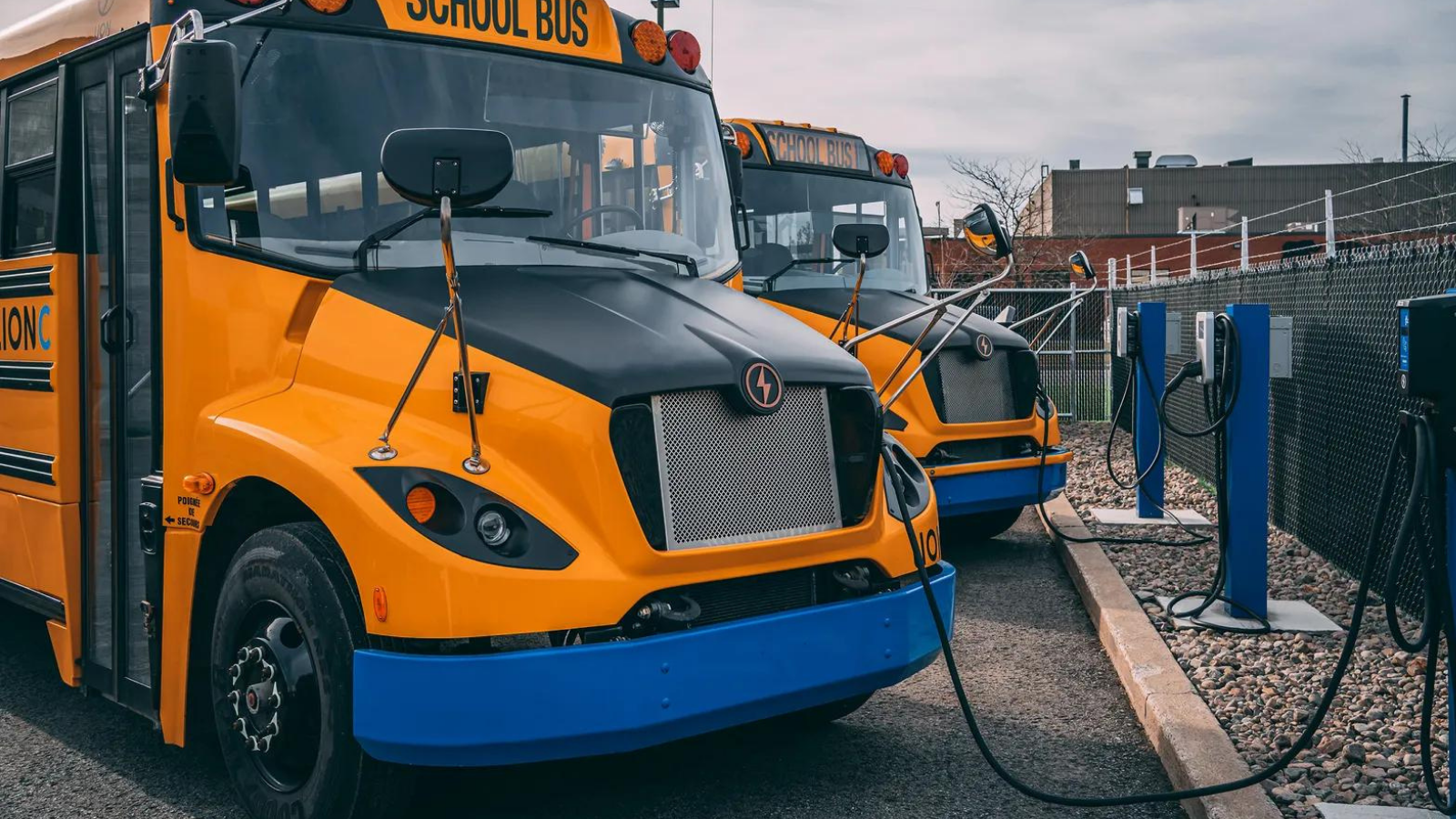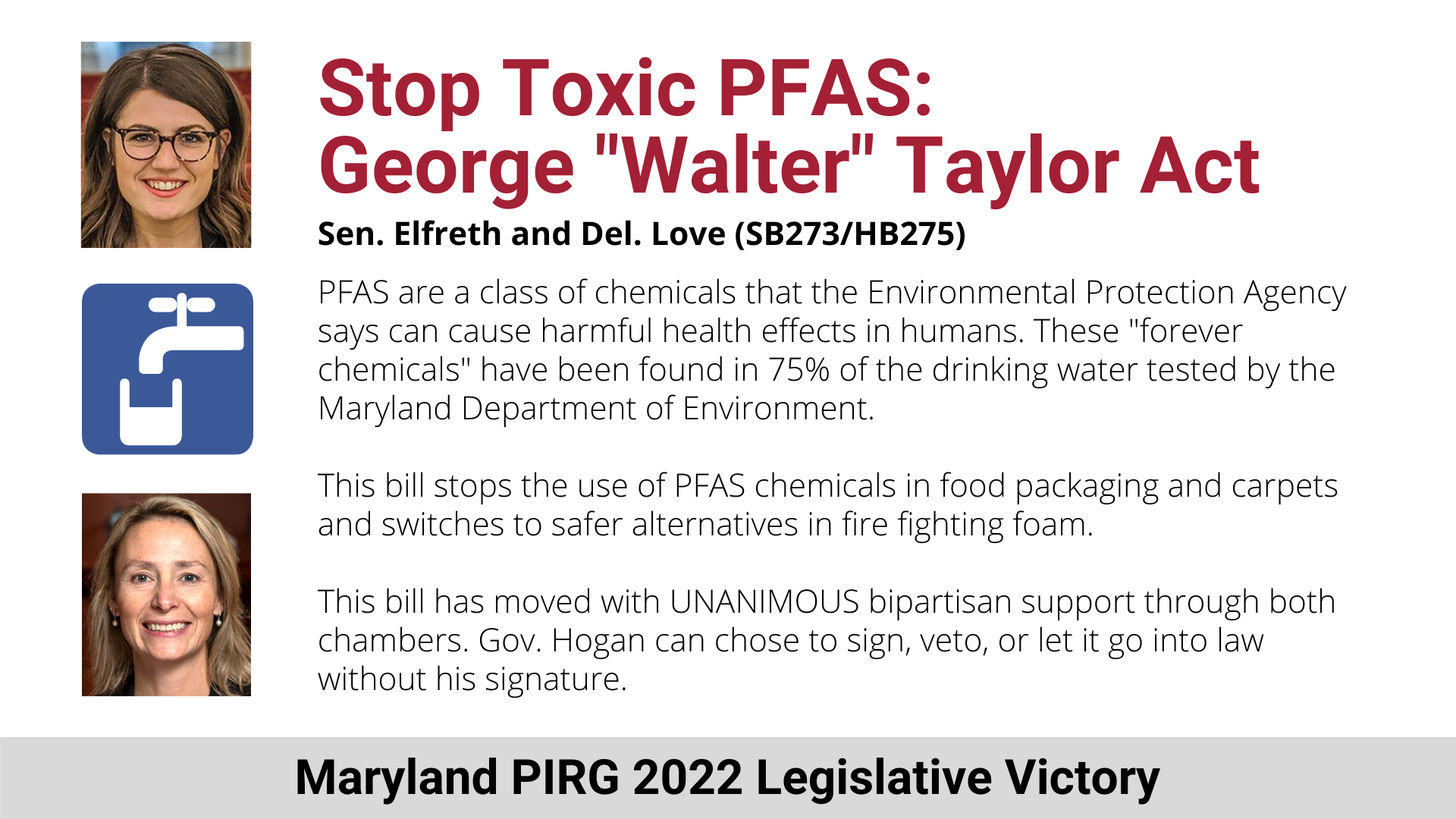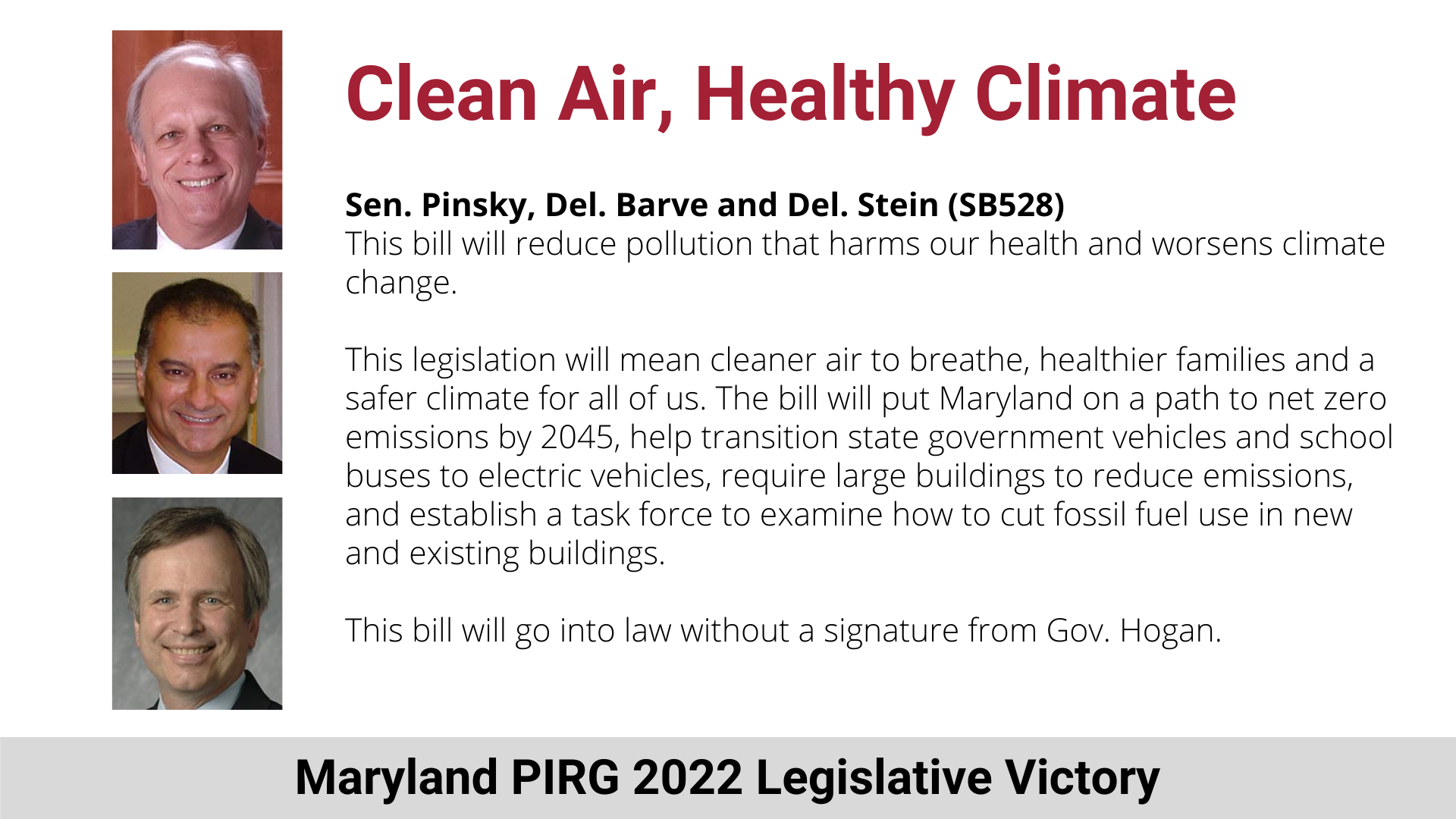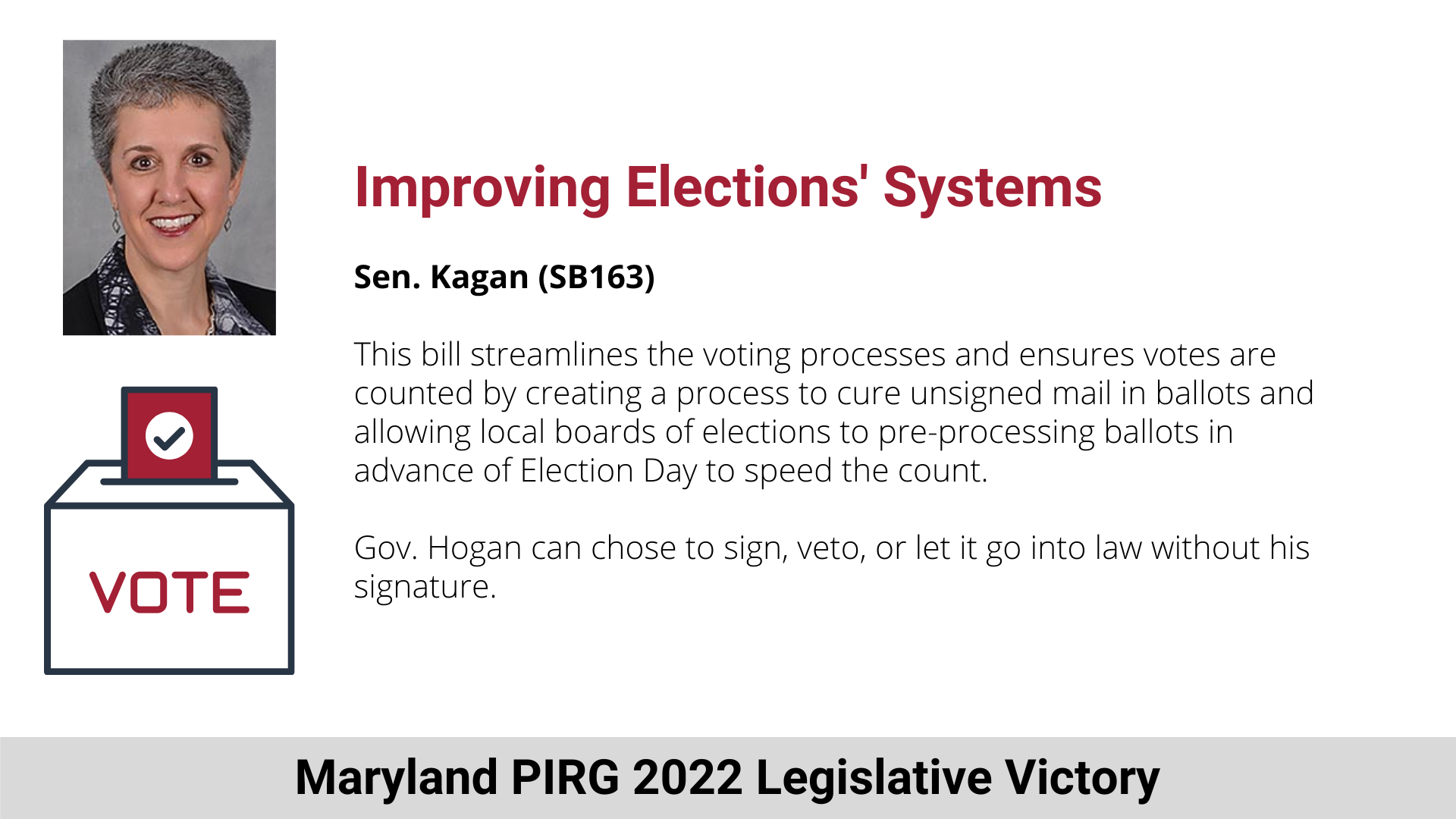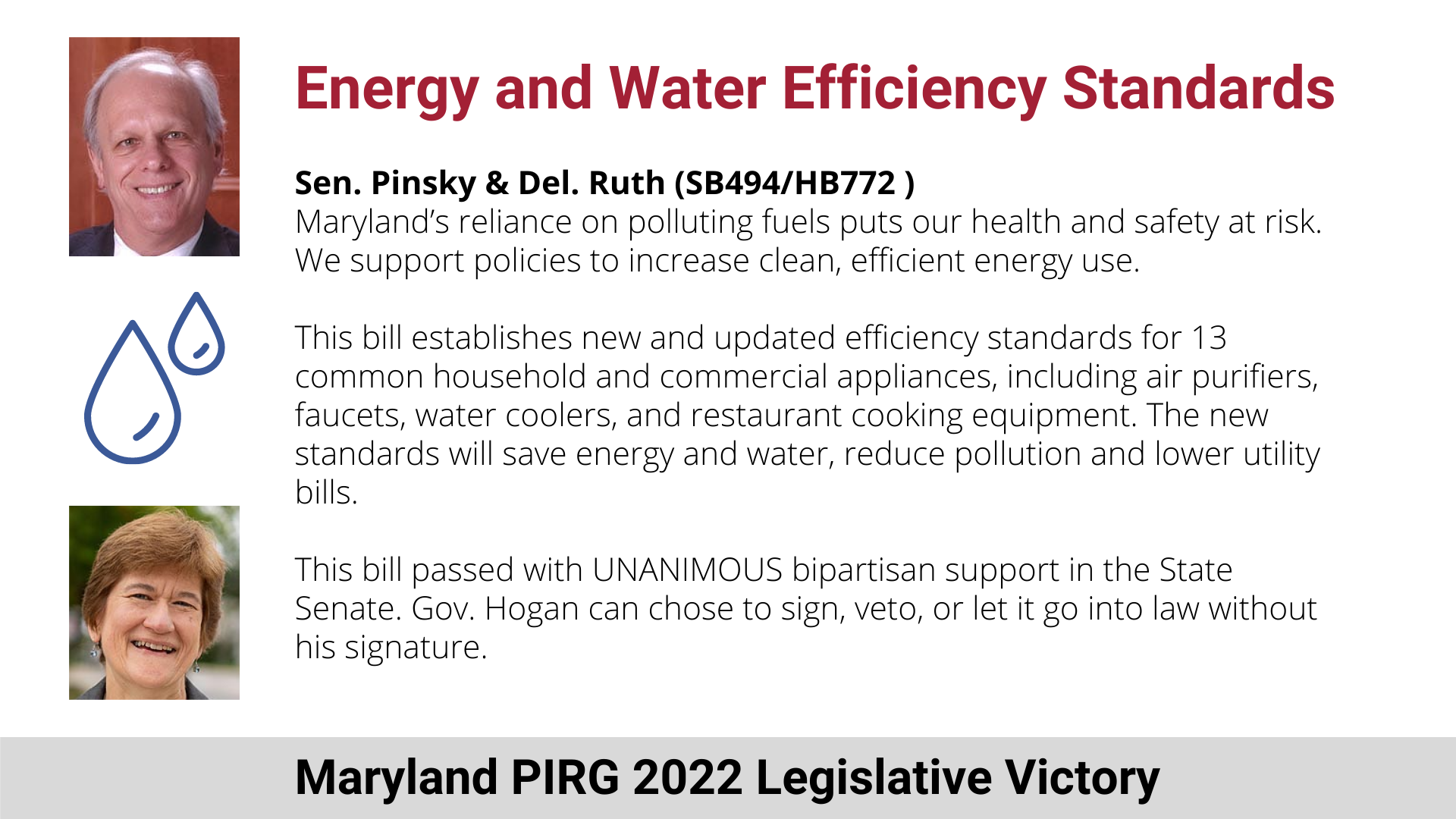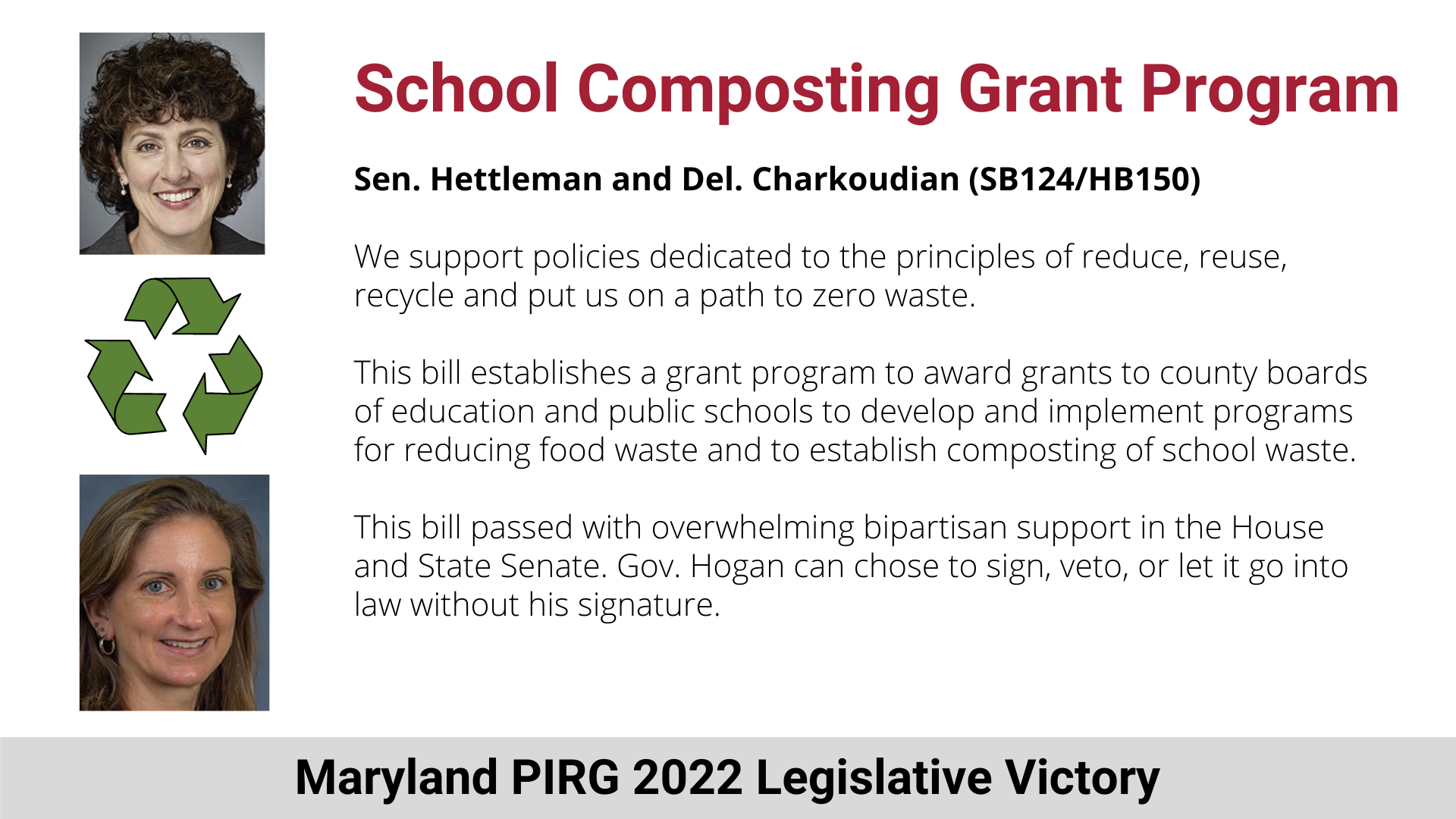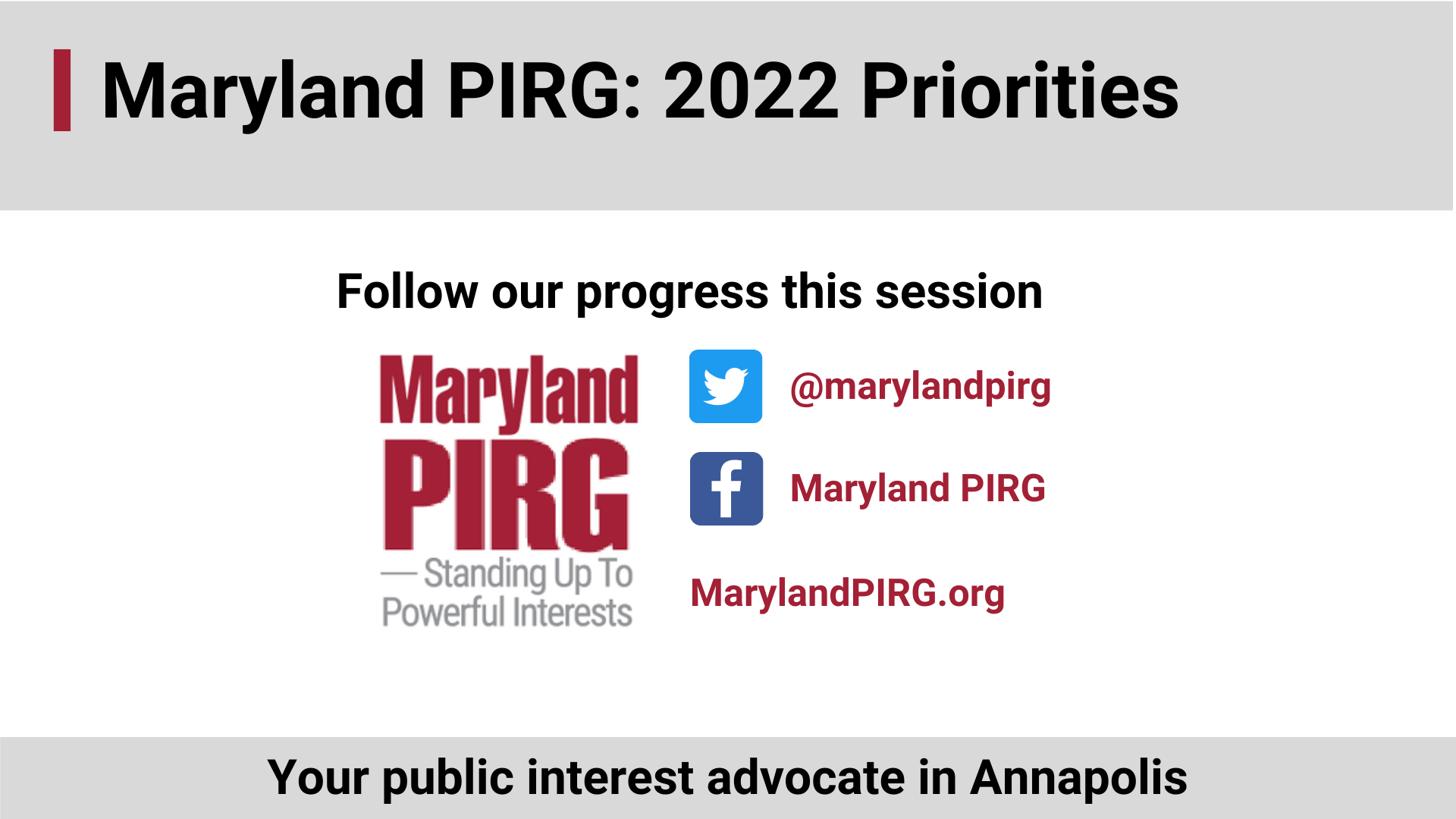Public Interest Victories
The George “Walter” Taylor Act – Sen. Elfreth and Del. Love (SB273/HB275): PFAS are a class of chemicals that the Environmental Protection Agency says can cause harmful health effects in humans. These “forever chemicals” have been found in 75% of the drinking water tested by the Maryland Department of Environment. This bill stops the use of PFAS chemicals in food packaging and carpets and switches to safer alternatives in fire fighting foam. This bill has moved with UNANIMOUS bipartisan support through both chambers. Gov. Hogan signed this bill into law. Read our testimony.
Clean Air, Healthy Climate – Sen. Pinsky, Del. Barve and Del. Stein (SB528): This bill will reduce pollution that harms our health and worsens climate change. This legislation will mean cleaner air to breathe, healthier families and a safer climate for all of us. The bill will put Maryland on a path to net zero emissions by 2045, help transition state government vehicles and school buses to electric vehicles, require large buildings to reduce emissions, and establish a task force to examine how to cut fossil fuel use in new and existing buildings. This bill will go into law without a signature from Gov. Hogan. Read our testimony.
Improving Election Systems – Sen. Kagan (SB163): This bill streamlines the voting processes and ensures votes are counted by creating a process to cure unsigned mail in ballots and allowing local boards of elections to pre-processing ballots in advance of Election Day to speed the count. Gov. Hogan vetoed this bill, some of it’s provisions will go into effect through the State Board of Elections, but others will need to be voted on in 2023. Read our testimony.
Energy and Water Efficiency Standards – Sen. Pinsky & Del. Ruth (SB494/HB772 ): Maryland’s reliance on polluting fuels puts our health and safety at risk. We support policies to increase clean, efficient energy use. This bill establishes new and updated efficiency standards for 13 common household and commercial appliances, including air purifiers, faucets, water coolers, and restaurant cooking equipment. The new standards will save energy and water, reduce pollution and lower utility bills. This bill passed with UNANIMOUS bipartisan support in the State Senate. This bill will go into law without a signature from Gov. Hogan. Read our testimony.
Low Income Energy Efficiency – Sen. Feldman and Del. Charkoudian (SB524/HB108): This bill will help improve energy efficiency in low income homes, saving energy, reducing pollution, and lowering utility bills. It sets a standard of 1% annual energy savings for low-income households, enables state-funded home energy performance audits in qualified low-income homes and funds energy efficiency improvements such as new insulation, better windows, EnergyStar® appliances, LED light bulbs and more. This bill passed with UNANIMOUS bipartisan support in the State Senate. Gov. Hogan vetoed this bill, and it will need to be reintroduced in 2023.
School Composting Grant Program – Sen. Hettleman and Del. Charkoudian (SB124/HB150): We support policies dedicated to the principles of reduce, reuse, recycle and put us on a path to zero waste. This bill establishes a grant program to award grants to county boards of education and public schools to develop and implement programs for reducing food waste and to establish composting of school waste. This bill passed with overwhelming bipartisan support in the House and State Senate. Gov. Hogan signed this bill into law.
Electric School Bus Transition – Del. Fraser-Hidalgo (HB696): Each year, pollution from cars, trucks and other vehicles cuts short an estimated 58,000 lives, and increases the risk of lung cancer, stroke and heart disease. Transportation is also America’s number one source of carbon pollution. This bill creates a pilot program from electric school buses, which is a common sense way to protect public health from diesel pollution and fight global warming. This bill will go into law without a signature from Gov. Hogan
Medical Bill Reimbursement- Sen. Hayes and Del. Charkoudian (SB944/HB694): We work to end exploitative practices and ensure a level playing field in the marketplace. Maryland hospitals collected an estimated $60 million from patients who should have received free medical care in 2017 and 2018. This bill requires hospitals to refund the money they should not have collected. This bill passed with overwhelming bipartisan support in the House and State Senate. This bill will go into law without a signature from Gov. Hogan. Read our testimony.
Low and Moderate Income Solar Tax Credits – Sen. Elfreth and Del. Smith (SB264/HB76): Maryland’s reliance on polluting fuels puts our health and safety at risk. We support policies to increase clean, efficient energy use. This bill reduces the tax burden on rooftop and parking canopy community solar projects that allocate at least 50% of the generated energy to Low and Moderate Income (LMI) households. This bill passed with UNANIMOUS bipartisan support in the State Senate. Gov. Hogan signed this bill into law. Read our testimony.




